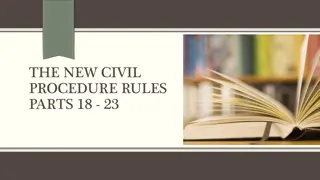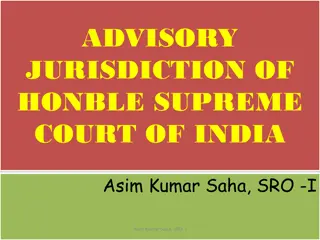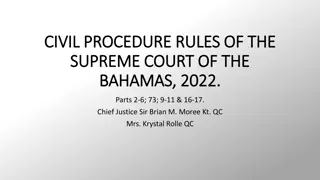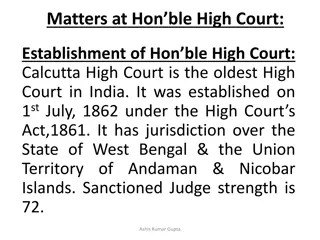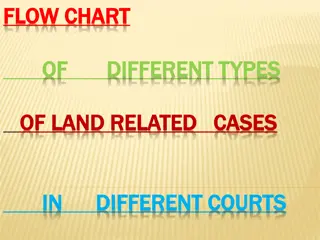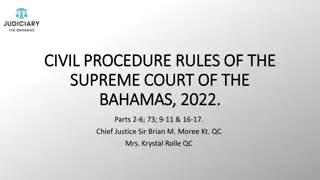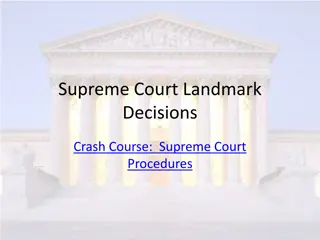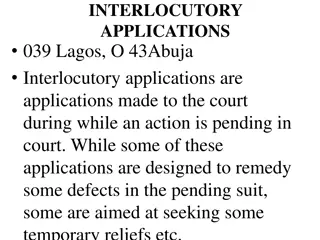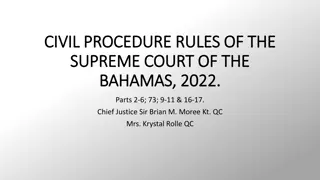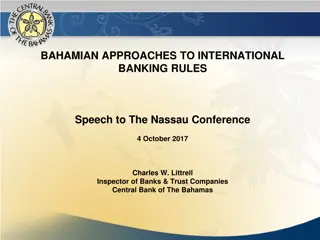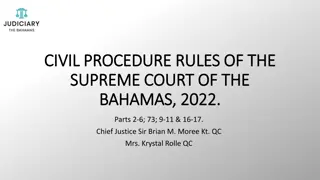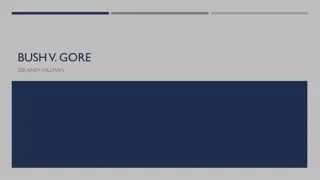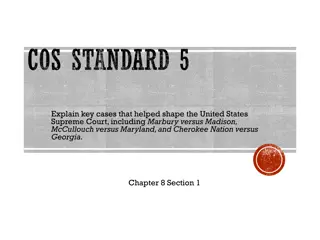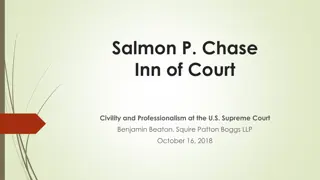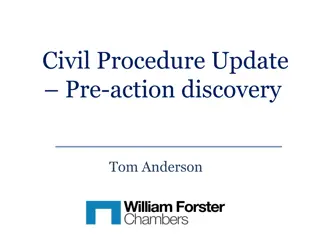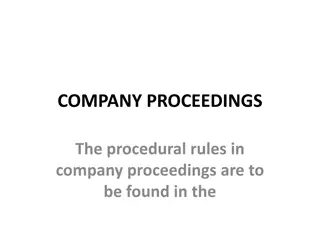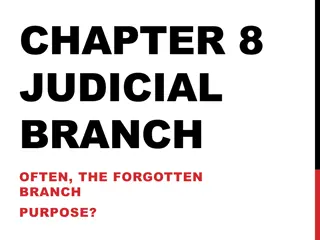Bahamian Supreme Court Proposed Civil Procedure Rules on Interlocutory Applications
The Commonwealth of The Bahamas Supreme Court has proposed rules regarding interlocutory applications, which involve applications for court orders made at various stages of legal proceedings. These rules outline the process for making such applications, including the grounds required, drafting of orders, conducting hearings, and situations where applications can be dealt with without a formal hearing. The Court also has powers to proceed in the absence of a party under certain conditions and to set aside orders in specific circumstances.
Download Presentation

Please find below an Image/Link to download the presentation.
The content on the website is provided AS IS for your information and personal use only. It may not be sold, licensed, or shared on other websites without obtaining consent from the author. Download presentation by click this link. If you encounter any issues during the download, it is possible that the publisher has removed the file from their server.
E N D
Presentation Transcript
COMMONWEALTH OF THE BAHAMAS SUPREME COURT PROPOSED CIVIL PROCEDURE RULES INTERLOCUTORY APPLICATIONS INTERLOCUTORY APPLICATIONS & CASE MANAGEMENT & CASE MANAGEMENT PANELISTS: JUSTICE INDRA CHARLES & MR. TERRY NORTH From: 11:15 a.m. 11.45 a.m. Q & A -11.45 a.m. 12.00 noon
INTERLOCUTORY APPLICATIONS Interlocutory applications called a Summons under RSC Order 29. The Proposed Rules deal with applications for Court Orders made before, during or after the course of proceedings. So far as practicable, all applications relating to pending proceedings must be listed for hearing at a case management conference or Pre-Trial Review. Where the application could have been dealt with at a Case Management or Pre-Trial Review, the Court MUST order the applicant to pay the costs of the application unless there are special circumstances. An application made before a claim has been issued MUST be made to the court office (registry) where it is likely that the claim to which the application relates will be made. The general rule is that an application MUST be made in writing in FORM (??)
WHAT THE APPLICATION MUST INCLUDE The Application must specify the grounds on which the applicant is seeking the Order and the Order which is being sought: The applicant must file with the application or not less than 3 days before the hearing, a DRAFT of the Order sought and SERVE a copy on ALL respondents. If the application is made WITHOUT NOTICE (no longer EX PARTE), THE DRAFT ORDER MUST BE FILED with the application. In relation to the conduct of the application, the Court has wide powers. The Court may (a) issue a witness summons requiring a party to attend court on the hearing of the application; (b) cross-examination of witnesses may occur; (c) The court may question a witness or party by putting written questions and asking the witness to give written answers or orally; (d) The Court may exercise any power which it might exercise at a case management conference.
APPLICATIONS WHICH MAY BE DEALT WITH WITHOUT HEARING (sometimes called paper applications ) The Court may deal with an application WITHOUT a hearing if: (a) no notice of the application is required; (b) the Court considers that the application can be dealt with over the telephone or by other means of communication; (c) the court does not consider that a hearing would be appropriate; (d) the parties agree; or (e) the parties have agreed to the terms of the Order (Consent Order). UNDER OTHER PARTS OF THE RULES, THE COURT HAS POWER TO DEAL WITH APPLICATIONS BY ELECTRONIC MEANS. NB: The Court has the power to proceed in the absence of a party who has been served and the Court also has the power to set aside an order made in the absence of a party if certain conditions are satisfied. The application to set aside MUST be made within 14 days after the date that it was served. The application MUST be supported by evidence on affidavit. You need to demonstrate to the Court that if you had attended some other order might have been made and a good reason for not attending.
INTERIM REMEDIES The Court may grant interim remedies including: - an interim injunction; - an order for accounts; - a freezing order (Mareva Injunction); *dealing with an asset whether located within the jurisdiction or not; *removing from the jurisdiction assets located here; - a search order (Anton Pillar) requiring a party to admit another party to premises for the purpose of the preservation of evidence; - an order for interim payment IMPORTANT: The fact that a particular type of interim remedy is not listed does not affect any power that the Court may have to grant that remedy and the Court may grant an interim remedy whether or not there has been a claim for a final remedy of that kind. THE CHIEF JUSTICE may issue a practice direction as to the procedure for applying for an interim order including, in particular, interim injunctions, search orders and freezing orders.
INTERIM REMEDIES AND SEARCH ORDERS How to apply for an interim injunction is comprehensively provided for. The Court may grant an interim remedy on an application made WITHOUT NOTICE if it appears that there are good reasons for doing so. The application must state the reason why no notice was not given. The Court may grant an interim order on an application made without notice for a PERIOD OF NOT MORE THAN 28 DAYS unless any of the Rules provide for a longer period in which case certain requirements must be satisfied. Search orders have also been elaborately provided for in our proposed rules. The requirements for the grant of search orders are dealt with in the Rules. An applicant seeking such an order must have a strong prima facie case. Also, like injunctions undertaking as to damages and reasonable costs and disbursements are all provided for. If the court makes a search order, an independent attorney must be appointed to supervise the execution of the order.
RECEIVERS BY INTERLOCUTORY APPLICATION RSC ORDER 30 PROPOSED RULES Application may be made by Summon or motion. Application MUST be made by INTERLOCUTORY APPLICATION. An application for an injunction ancillary or incidental to an order appointing a receiver may be joined with the application for such order. Same as the Existing Rules. Where an applicant wishes to apply for an immediate grant of such an injunction, he may do so ex parte. Same as O. 30 (1)(3)
CASE MANAGEMENT (The fundamental idea of case management is that the ultimate responsibility for the control of litigation must move from the litigants and their legal practitioners to the Court) There are four (4) important components: ) Case Management : The Objective (2) Case Management: The Court s Powers (3) Case Management Conferences (4) Pre-Trial Review
The Objective (Court s duty to actively manage cases) The court must further the overriding objective by actively managing cases Proposed New Rules Order 31 A (a) actively encouraging and assisting parties to settle the whole or part of their case on terms that are fair to each party; (a) encouraging the parties to co-operate with each other in the conduct of proceedings; - (same as (g)) (b) considering whether the likely benefits of taking a particular step will justify the cost of taking it; (b) identifying the issues at an early stage; - (same as (l)) (c ) deciding promptly which issues need full investigation and trial and accordingly disposing summarily of others; - (same as (e)) (c) dealing with as many aspects of the case as is practicable on the same occasion; (d) deciding the order in which issues are to be resolved; - (same as (f)) (d) dealing with as many aspects of the case, as it appears appropriate to do so without requiring the parties to attend court; (e) encouraging the parties to use any appropriate form of dispute resolution and facilitating the use of such procedures; - (basically the same as (h)) (e) deciding promptly which issues need full investigation and trial and accordingly disposing summarily of others; (f) actively encouraging and assisting parties to settle the whole or part of their case on terms that are fair to each party; -(same as (a)) (f) deciding the order in which issues are to be resolved; (g) encouraging the parties to co-operate with each other in the conduct of proceedings; (g) setting time standards or otherwise controlling the progress of the case: -(same as (j) except the words now proposed are fixing timetables )
The Objective (Court s duty to actively manage cases) The court must further the overriding objective by actively managing cases Order 31A Proposed Rules (h) encouraging the parties to use any appropriate form of dispute resolution including, in particular, mediation, if the court considers it appropriate and facilitating the use of such procedures; (h) considering whether the likely benefits of taking a particular step will justify the cost of taking it; - (same as (b)) (i) dealing with as many aspects of the case as is practicable on the same occasion; -same as (c)) (i) ensuring that no party gains an unfair advantage by reason of that party s failure to give full disclosure of all relevant facts prior to the trial or the hearing of any application; (j) dealing with as many aspects of the case, as it appears appropriate to do so without requiring the parties to attend court; - same as (d)) (j) fixing timetables or otherwise controlling the progress of the case; (k) make appropriate use of technology; -(same as (m)) (l) (k) giving directions to ensure that the trial of the case proceeds quickly and efficiently; -(same as (k)) (k) giving directions to ensure that the trial of the case proceeds quickly and efficiently. (m) ensuring that no party gains an unfair advantage by reason of that party s failure to give full disclosure of all relevant facts prior to the trial or the hearing of any application. (same as (i)) (l) identifying the issues at an early stage; (m) make appropriate use of technology.
CASE MANAGEMENT THE COURTS POWERS (BASICALLY THE SAME AS UNDER ORDER 31A , PART IV POWERS OF THE COURT) COURT S GENERAL POWERS OF MANAGEMENT This list of powers in this rule is an addition to any powers given to the court by any other rule, practice directions or any enactment The Court has 23 powers under its general powers of management. This list is non-exhaustive. Some of the wide powers given to the Court are: adjourn or bring forward a hearing to a specific date; (a) (b) consolidate proceedings; deal with a matter without the attendance of any of the parties; (c) (d) direct the order in which issues are tried; direct a separate trial of any issue; (e) direct that any evidence be given in written form e.g. witness statements (f) direct that notice of any proceedings or application be given to any person; (g) (h) direct that part of any proceedings (such as a counterclaim or other ancillary claim) be dealt with as separate proceedings; dismiss or give judgment on a claim after a decision on a preliminary issue; (i)
CASE MANAGEMENT THE COURTS POWERS (j) exclude an issue for determination if the court can do substantive justice between the parties on the other issues and determines it would serve no worthwhile purpose; (k) extend of shorten the time for compliance with any rule, practice direction, order or direction of the court even if the application for the extension is made after the time for compliance has passed; (l) give the conduct of any matter to any person it thinks fit and make any appropriate consequential; (m) hold a hearing and receive evidence by telephone or use any other method of direct communication; (n) instead of holding an oral hearing, deal with a matter on written representations submitted by the parties; (o) require any party or a party s legal practitioner to attend the court; (p) require the maker of an affidavit or witness statement to attend for cross-examination; (q) stay the whole or part of any proceedings generally or until a specified date or event; (r) transfer proceedings to the Family Court or the Magistrate Court;
CASE MANAGEMENT THE COURTS POWERS (s) transfer the whole or any part of any proceedings to another court office (registry), e.g. Grand Bahama; (t) try two or more claims on the same occasion; (u) where there is a substantial inequality in the proven financial position of each party, order any party having the greater financial resources who applies for an order to pay the other party s costs of complying with the order in any event; (v) where two or more parties are represented by the same attorney (i) direct that they be separately represented; and (ii) representation to be arranged; and if necessary, adjourn any hearing to a fixed date or take some other step to enable separate (iii) make any consequential order as to costs thrown away; (w) THE PURPOSE OF MANAGING THE CASE AND FURTHERING THE OVERRIDING OBJECTIVE. TAKE ANY OTHER STEP, GIVE ANY OTHER DIRECTION, OR MAKE ANY OTHER ORDER FOR
THE COURTS POWERS TO MAKE ORDERS OF ITS OWN INITIATIVE This is not a novel rule: already provided for in O. 31A r. 19: The Proposed Rules is intended to remain the same: It mirrors O. 31 A r. 19 (1) (2) (3) and (4) and provide: Except where a rule or other enactment provides otherwise, the court may exercise its powers on an application or of its own initiative. The rule goes on to state: (2) reasonable opportunity to make representations. If the court proposes to make an order of its own initiative it must give any party likely to be affected a (3) as the court considers reasonable. Such opportunity may be to make representations orally, in writing, telephonically or by such other means (4) Where the court proposes to - (a) make an order of its own initiative; and (b) hold a hearing to decide whether to do so, the Registry (court office) must give each party likely to be affected by the order at least 7 days notice of the date, time and place of the hearing.
SANCTIONS STRIKING OUT STATEMENT OF CASE Again, there is no novelty in this Part of the rule as Order 31A 6. 20 gives the Court the power to strike out a statement of case (pleading) or part of a statement of case. The Proposed Rules state: (1) In addition to any other power under these Rules, the court may strike out a statement of case or part of a statement of case where it appears to the court that (a) there has been a failure to comply with a rule or practice direction or with an order or direction given by the court in the proceedings; (b) the statement of case or the part to be struck out does not disclose any reasonable ground for bringing or defending a claim; (c) the statement of case or the part to be struck out is an abuse of the process of the court or is likely to obstruct the just disposal of the proceedings; (ABUSE IS NOT IN O. 31 BUT IN O. 18 R. 19); (d) that the statement of case or the part to be struck out is prolix or does not comply with the requirements of Part 8 or 10. (2) the defendant; and (c) before those costs are paid, the claimant starts a similar claim against the same defendant based on substantially the same facts, the court may on the application of the defendant stay the subsequent claim until the costs of the first claim have been paid. Where (a) the court has struck out a claimant s statement of case; (b) the claimant is ordered to pay costs to
COURTS GENERAL POWERS TO STRIKE OUT STATEMENT OF CASE The Proposed Rules are almost identical with Order 31A r. 21 except that O. 31 provides for a draft order to accompany the application. (1) If a party has failed to comply with any of these rules or any court order in respect of which no sanction for non-compliance has been imposed, any other party may apply for an UNLESS ORDER. (2) An application under (1) MAY BE MADE WITHOUT NOTICE but must be supported by evidence on affidavit. The Proposed Rules also address JUDGMENT WITHOUT TRIAL AFTER STRIKING OUT Now contained in Order 31A r. 22 SETTING ASIDE JUDGMENT ENTERED AFTER STRIKING OUT as in Order 31 A is provided for in similar language.
RELIEF FROM SANCTIONS The Proposed Rules mirror O. 31 A, r. 25 The Proposed Rules state: (1) An application for relief from sanction imposed for a failure to comply with any rule, order or direction MUST BE: (a) made promptly; and (b) supported by evidence on affidavit. (2) The court MAY grant relief only if it is satisfied that (a) the failure to comply was not intentional; (b) there is a good explanation for the failure; and (c) the party in default has generally complied with all other relevant rules, practice directions, orders and directions. (3) In considering whether to grant relief, the Court MUST have regard to (a) the effect which the granting of relief or not would have on each party; (b) the interests of the administration of justice; whether the failure to comply has been or can be remedied within a reasonable time; (d) whether the failure to comply was due to the party or the party s legal practitioner; and (e) whether the trial date or any likely trial date can still be met if relief is granted. (4) The Court may not order the respondent to pay the applicant s costs in relation to any application for relief unless EXCEPTIONAL CIRCUMSTANCES are shown.
CASE MANAGEMENT CONFERENCE AND PRE- TRIAL REVIEW FIXED DATE CLAIMS FIRST HEARING FIXED DATE CLAIMS First hearing claims include proceedings for specified sum of money; possession of land, claims arising out of hire purchase or credit agreements or wherever its use is required by a rule or practice direction. (1) When a fixed date claim is issued the court must fix a date for the first hearing of the claim. (2) powers of a case management conference. On the first hearing, in addition to any other powers that the court may have, the court shall have all the (3) The court may, however, treat the first hearing as the trial of the claim if (a) it is not defended; or (b) it considers that the claim can be dealt with summarily. (4) The general rule is that the court must give at least 14 days notice of any first hearing. (5) The court may on or without an application direct that shorter notice be given. (a) where the parties agree; or (b) in urgent cases. (6) service of the claim form and the relevant documents specified in rule 5.2(3) at least 7 days before the first hearing. Unless the defendant files an acknowledgement of service the claimant must file evidence on affidavit of
CASE MANAGEMENT CONFERENCE AND PRE- TRIAL REVIEW CASE MANAGEMENT CONFERENCE (SLIGHTLY DIFFERENT FROM O. 31 A) PART III) (1) The general rule is that the court office must fix a case management conference immediately upon the filing of a defence to a claim other than a fixed date claim. (2) management conference is not to be fixed until the claimant (plaintiff) gives notice under rule 14.6(3) that the claim is to continue. If the defendant files a defence and also an admission of a specified sum of money, the case (3) after the defence is filed (or notice is given under rule 14.6(3)) unless any rule or practice direction prescribes a shorter or longer period or the case is urgent. (not sure about this) The case management conference must take place not less than 4 weeks nor more that 8 weeks (4) before a defence is filed. Notwithstanding paragraph (3) a party may apply to the court to fix a case management conference (5) The application may be without notice but must state the reasons for the application. (6) management conference. The Registrar must give all parties not less than 14 days notice of the date, time and place of the case (7) The court may with or without an application direct that shorter notice be given (a) if the parties agree; or (b) in urgent cases.
CASE MANAGEMENT CONFERENCE AND PRE-TRIAL REVIEW ATTENDANCE AT CASE MANAGEMENT CONFERENCE OR PRE-TRIAL REVIEW (1) If (Where) a party is represented by a legal practitioner, that legal practitioner or another legal practitioner who is authorised to negotiate on behalf of the client and competent to deal with the case must attend the case management conference and any pre-trial review. (2) The general rule is that the party or a person who is in a position to represent the interests of the party (other than the legal practitioner ) must attend the case management conference or pre-trial review. (3) The court may dispense with the attendance of a party or representative (other than a legal practitioner). (4) If the case management conference or pre-trial review is not attended by the legal practitioner and the party or a representative, the court may adjourn the case management conference or pre-trial review to a fixed date and may exercise any of its powers under Part 26 (case management the court s powers) or Part 64 (costs general).
ORDERS TO BE MADE AT CASE MANAGEMENT CONFERENCE ( SLIGHTLY DIFFERENT FROM O. 31A R. 13 BUT IT REPLICATES THE ECSC 2015) (1) The general rule is that at a case management conference the court must consider whether to give directions for - (a) service of experts reports (if any); (b) service of witness statements; and (c) standard disclosure and inspection; by dates fixed by the court. (2) The court may also give directions for the preparation of an agreed statement (a)as to any relevant specialist area of law; (b) of facts; (c) of issues; and (d) of scientific or medical matters in issue, the basic technical, which statement does not bind the trial judge. (3) The court must fix a date for a pre-trial review unless it is satisfied that having regard to the value, importance and complexity of the case it may be dealt with justly without a pre-trial review. (4) The court must in any event, fix the (a) date on which a listing questionnaire is to be sent by the Court office to the parties; and (b) period within which the trial is to commence or the trial date. (5) The court office must serve an order containing the directions made on all parties and give notice of the (a) date of any pre-trial review; (b) date on which the listing questionnaire is to be sent out by the Registrar; and (c) trial date or trial period.
OTHER CASE MANAGEMENT DIRECTIONS The Proposed CPR Rules deal with: (1) Dispensing with case management conference in simple and urgent proceedings; (2) Adjournment of Case Management Conference the court may not adjourn a case management conference without fixing a new date, time and place for the adjourned CMC. In other words, CMC may not be adjourned SINE DIE. (3) Variation of Case Management Conference timetable A party MUST apply to the court if that party wishes to vary a date which the court has fixed for (i) CMC; (ii) a PTR; Trial Date. (4) The Rules contain a section which deals with Listing Questionnaire and Fixing Trial Date. Order 31 A r. 14-17 also provide for (1) variation of case management timetable, Listing Questionnaire and Fixing Trial Date. Tennyson, Morte d Arthur said: The old order changeth, yielding place to new, And God fulfils Himself in many ways, Lest one good custom should corrupt the world .






